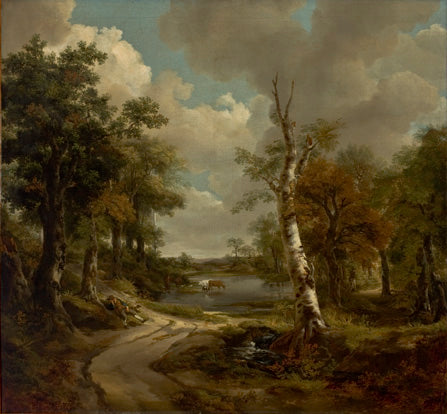Description
In the vast repertoire of the art of the 18th century, the work "Drinkstone Park (Cornard Woodland)" by Thomas Gainsborough is presented as a splendid example of the painter's sensitivity towards nature and its particular ability to capture light and atmosphere. Painted in 1747, this work reveals not only the technical mastery of Gainsborough, but also a deep connection with the landscapes around him. Gainsborough, known for its portraits and landscapes, stands out in this painting For its ability to intertwine elements of reality with a romantic ideal, offering a window to a world of pastoral beauty.
Visually, the composition of "Drinkstone Park" is a harmonious amalgam of organic forms and fluid lines. The trees, mostly of robust trunks, extend towards the sky, their glasses are intertwined in a deployment of vibrant green. This use of the wooded landscape as a framed backdrop resonates with its characteristic approach: emphasizing the majesty of nature while suggesting a human point of view against the sublime. The light is filtered through the leaves, creating a shadow game that gives life to the scene. The variation in Green tones reveals the Gainsborough skill to capture the subtle differences in the light and the atmosphere of the environment.
As for the representation of water, a short path is perceived that seems to reflect the blue sky, which adds a dimension of serenity to the paint. The water here serves as a transition element, creating a contrast between the terrestrial life and the immensity of the sky, which is completed with some clouds in a soft texture. This reflection of heaven becomes a metaphor for peace and idealism, intrinsic characteristics of pastoral art, which Gainsborough evokes with ease.
The absence of human figures in the work may seem remarkable, given the context of a work by Gainsborough, however, this choice intensifies the sensation of a pure and intact landscape. The lack of characters allows the viewer to immerse themselves in the majesty of the environment, causing personal reflection and a deeper emotional connection with nature. In a period of growing industrialization, the work can be interpreted as a romantic yearning for the natural, the idyllic and the wild.
It is important to consider that Gainsborough cultivated a style that dialogue both with the traditions of the English landscape and with contemporary European influences, often manifesting a deep sense of the sublime. His technique, which implies loose brushstrokes and a palette rich in nuances, is present in this work, reminding the spectators the ability of the natural universe to evoke astonishment.
"Drinkstone Park (Cornard Woodland)", beyond being a specific place, acts as a testimony of Gainsborough's talent to evoke serene beauty of the English landscape and his deep love for nature. In each sparkle of light and every bow in foliage, the viewer is invited to experience not only the view, but the very experience of being immersed in a world where nature reigns. When observing this painting, one can almost feel the soft breeze of the field and listen to the whisper of the leaves, reminding us of the eternal connection between the human being and its natural environment. In this sense, Gainsborough bequeathed us not only artworks, but a deeply emotional experience that still resonates in the contemporary world.
KUADROS ©, a famous paint on your wall.
Hand-made oil painting reproductions, with the quality of professional artists and the distinctive seal of KUADROS ©.
Reproduction service paintings With a guarantee of satisfaction. If you are not completely satisfied with the replica of your painting, we refund your money 100%.

